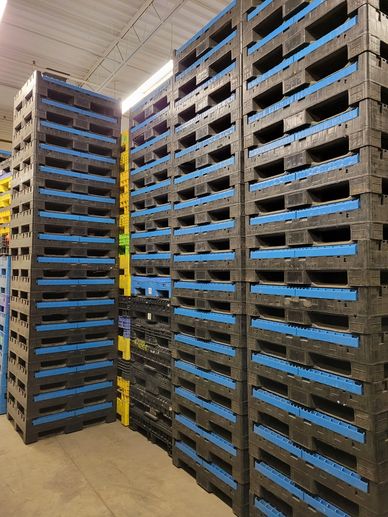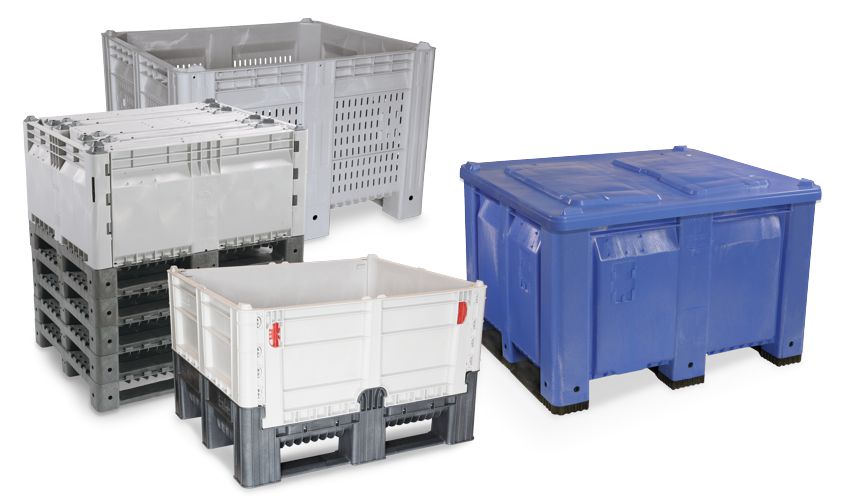The benefits of using used plastic containers for packaging and logistics
Wiki Article
The Ultimate Overview to Selecting the Right Bulk Containers for Your Company Needs
Picking the proper bulk containers is essential for any type of business that counts on efficient logistics. Different kinds of containers exist, each made for certain materials and applications. Aspects such as size, product compatibility, and governing criteria play a significant duty in this decision-making process. Comprehending these aspects can result in boosted functional performance. Nonetheless, several businesses ignore essential facets that could boost their general performance and sustainability. What are these factors to consider?Understanding Different Kinds Of Bulk Containers
Mass containers function as essential devices for organizations seeking effective storage space and transportation services. These containers come in different types, each developed to satisfy certain operational requirements. One common type is the intermediate bulk container (IBC), which is perfect for granulated and fluid products, providing an equilibrium of capability and ability to move. An additional preferred option is the mass bag, or FIBC, appropriate for dry, flowable items. These adaptable containers are light-weight and can be conveniently transferred and stored. For larger products, rigid bulk containers are frequently utilized, offering durability and stability for safe handling. In addition, there are specific containers customized for harmful products, guaranteeing compliance with safety and security guidelines. Comprehending the distinct features of these bulk container kinds allows businesses to make informed choices that maximize logistics and decrease costs. By selecting the right container, companies can boost their functional effectiveness and improve their supply chain processes.Key Product Factors To Consider for Bulk Containers
When choosing bulk containers, it is important to contemplate the products made use of in their building and construction. Factors such as toughness, resilience, and chemical compatibility play a crucial role in ensuring the containers satisfy specific operational needs. Additionally, weight and portability worries can impact both performance and transportation logistics.Product Longevity and Strength
Resilience and strength are critical consider selecting products for bulk containers, as they straight affect the container's capacity to endure numerous ecological problems and dealing with procedures. Products such as high-density polyethylene (HDPE), polypropylene, and stainless-steel are commonly favored for their robust buildings, offering resistance to abrasion, temperature level, and effect changes. The selection of product also impacts the total lifespan of the container; stronger products generally lead to much less frequent replacements, resulting in cost savings in time. Furthermore, the weight of the material can affect shipping costs and simplicity of handling. Organizations need to consider their certain functional settings and the possibility for wear and tear to guarantee peak longevity and toughness in their mass container selection.Chemical Compatibility Variables
Comprehending chemical compatibility is necessary for choosing bulk containers, as the products used must withstand the specific substances they will hold. Numerous variables influence compatibility, including the chemical nature of the contents, temperature level, and period of storage. For instance, harsh chemicals may need containers made from stainless-steel or specialized plastics that resist degradation. Furthermore, reactive materials can create warmth or gases, requiring vented or pressure-rated containers. The choice of container product, whether polycarbonate, polyethylene, or metal, ought to line up with the chemical residential properties of the saved materials to stop breaches or leakages. Ultimately, a detailed examination of these compatibility elements ensures safe handling and storage, protecting both employees and the environment while maintaining product integrity.Weight and Mobility Problems
Choosing mass containers involves not just assessing chemical compatibility yet additionally taking into consideration weight and transportability. Companies need to analyze the simplicity of handling and transportation to enhance effectiveness. Lightweight products like high-density polyethylene (HDPE) or light weight aluminum can help with much easier motion and lower delivery costs. Alternatively, larger containers may supply enhanced sturdiness however can impede movement, especially in atmospheres needing constant moving. In addition, the layout of the container must permit practical lifting and piling, ensuring ergonomic security for workers. Business need to likewise take into consideration the facilities offered for transportation; as an example, containers compatible with forklifts or pallet jacks can enhance operations. Eventually, the right equilibrium between weight and transportability straight affects functional performance and cost efficiency.Sizing Your Mass Containers for Ideal Performance
When sizing mass containers, companies need to carefully assess the dimensions required to suit their specific products. In addition, weight capability is an important aspect that affects efficiency and safety and security throughout transportation and storage space. Effective sizing not just maximizes area yet likewise optimizes functional process.Establishing Container Dimensions
Choosing the best dimensions for mass containers is essential for making the most of effectiveness in storage space and transportation. Organizations have to assess their details requirements, considering elements such as offered area, the nature of the goods being kept, and the techniques of transportation utilized. Precise dimensions guarantee that containers fit preferably in automobiles and storage facilities, minimizing squandered room and minimizing taking care of time. Standard dimensions can supply ease, but personalized measurements may be essential for one-of-a-kind requirements or to suit details items. Furthermore, it is crucial to evaluate piling capabilities and availability, as these variables affect overall functional effectiveness. Inevitably, the appropriate dimensions lead to boosted organization and structured logistics, profiting the overall productivity of the business.Weight Capacity Considerations
Understanding weight capacity is crucial for businesses intending to enhance their mass container effectiveness. The weight capacity of a container straight impacts storage abilities, transport logistics, and general operational expenses. Selecting containers with the suitable weight restrictions guarantees that companies can securely store and carry their products without taking the chance of damage or compliance concerns. Straining containers can lead to structural failings, while underutilizing capability outcomes in squandered resources. When picking containers, it is important for services to evaluate their product weights and think about any type of regulative needs. Furthermore, variables such as the kind of product, intended usage, and ecological conditions must additionally influence weight capacity choices. By evaluating these aspects, businesses can enhance efficiency and ensure a streamlined supply chain.Regulatory Conformity and Safety Criteria

Regulative conformity and safety requirements play a crucial function in the option of bulk containers for organizations. Organizations needs to assure that their containers meet various guidelines established by neighborhood, national, and international authorities. These standards frequently refer to product security, structural stability, and correct labeling, which assist prevent accidents and guarantee the safe transportation of goods.
Furthermore, adherence to industry-specific standards, such as those from the Food and Medicine Management (FDA) or the Occupational Security and Health Management (OSHA), is essential for business handling dangerous materials or food. Non-compliance can cause penalties, legal concerns, or damages to a business's reputation.
Companies need to additionally think about the container's compatibility with the products being saved or delivered to prevent contamination or chemical reactions (refurbished bulk containers). To sum up, comprehending and executing regulatory conformity and safety and security requirements is essential for the responsible and reliable use of mass containers
Sustainability Choices for Eco-Friendly Mass Containers

Firms are also discovering choices made from recycled products, which not only preserve resources yet likewise support the recycling market. Technologies in design enable for lighter containers that need much less power to transportation, even more improving sustainability. By integrating these eco-friendly bulk container options, businesses can show their dedication to environmental stewardship while fulfilling consumer demand here for lasting methods. This change not just assists the world but can also enhance brand reputation and client commitment.
Cost-Effectiveness and Budgeting for Bulk Containers
While several organizations concentrate on sustainability, cost-effectiveness continues to be a vital element when selecting mass containers. Organizations should analyze the preliminary purchase rate, as well as long-lasting operational expenses, to ensure financial practicality. Factors such as reusability, upkeep, and resilience play a considerable duty in establishing total expenditures.Buying top notch containers might yield higher ahead of time prices yet can result in financial savings through decreased substitute prices and lowered waste. In addition, services need to think about transportation expenses and storage space performance, as these can affect the overall budget plan.

Frequently Asked Inquiries
How Do I Establish the Right Container for Hazardous Materials?
To figure out the best container for unsafe materials, one need to review compatibility with the substance, take into consideration the container's product, look for regulatory compliance, and assess capacity and safety attributes to ensure correct handling and storage.Can Mass Containers Be Personalized for Specific Products?
Yes, bulk containers can be customized for certain products. used collapsible bulk containers. Various attributes, such as product, dimension, and design, can be customized to fulfill one-of-a-kind requirements, guaranteeing ideal safety and performance for moving and storing different goodsWhat Is the Average Lifespan of Different Mass Container Types?
The typical lifespan of mass container types varies; plastic containers last 5-10 years, steel containers 10-20 years, and wood containers usually last 3-7 years, depending upon usage, maintenance, and environmental conditions.Just how Should I Tidy and Maintain Mass Containers?
To clean and maintain bulk containers, one ought to regularly inspect for damage, remove deposit, wash with proper detergents, rinse thoroughly, and guarantee appropriate drying out before storage space. Complying with maker guidelines boosts longevity and safety and security throughout usage.Exist Rental Alternatives for Bulk Containers Available?
Yes, numerous companies supply rental alternatives for bulk containers, giving versatility for organizations. These leasings can fit numerous demands, allowing business to manage stock successfully without the commitment of purchasing containers outright.Sturdiness and strength are essential variables in picking materials for mass containers, as they straight affect the container's ability to stand up to different environmental conditions and taking care of procedures. Recognizing chemical compatibility is necessary for selecting mass containers, as the materials made use of must withstand the details materials they will hold. Understanding weight ability is important for organizations aiming to optimize their bulk container effectiveness. Regulative conformity and safety requirements play a vital duty in the option of mass containers for businesses. While many businesses concentrate on sustainability, cost-effectiveness stays an essential element when selecting bulk containers.
Report this wiki page